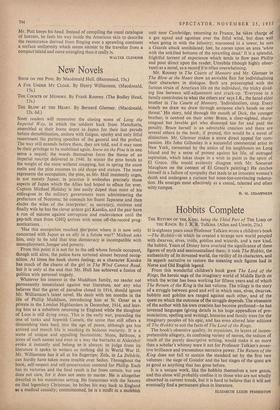Hobbits Complete
THE RETURN OF THE KING, being the Third Part of THE LORD OF THE RINGS. By J. R..12. Tolkien, (Allen and Unwin, 21s.) IT is eighteen years since Professor Tolkien wrote a children's book —The Hobbit—in which he created a strange new world peopled with dwarves, elves, trolls, goblins and wizards, and a new kind, the hobbit. Years of Disney have overlaid the significance of these. figures of myth and sentimentalised them; it took The Hobbit, the authenticity of its invented world, the virility of its characters, and its superb narrative to restore the meaning such figures had in Norse and Old English legend.
From this wonderful children's book grew The Lord of the Rings, the heroic saga of the imaginary world of Middle Earth on which the writer has been working for fifteen years and of which The Return of the King is the last volume. The trilogy is the story of a struggle between good and evil in which men, elves, dwarves, hobbits and goblins are ranged against each other, and of the quest on which the outcome of the struggle depends. The obsession of the author with his own creation has become profound—he has invented languages (giving details in his huge appendices of pro- nunciation, spelling and writing), histories and family trees for the imaginary peoples of his epic, and has even altered later editions of The Hobbit to suit the facts of The Lord of the Rings.
The book's obsessive quality, its mysticism, its layers of incom- prehensible allegory, its confusing variety of names, the tedium of much of the purely descriptive writing, would make it no more than a scholar's whimsy were it not for Professor Tolkien's inven- tive brilliance and tremendous narrative power. The Return of the King does not fail to sustain the standard set by the first two volumes: the siege of Gondor and the last stages of the quest are as good as anything that has gone before.
It is a unique work, like the hobbits themselves a new genus, and this alone will probably confine it to those who are not wholly absorbed in current trends, but it is hard to believe that it will not eventually find a permanent place in literature.
ELIZABETH LEIGH PEMBERTON


























































 Previous page
Previous page